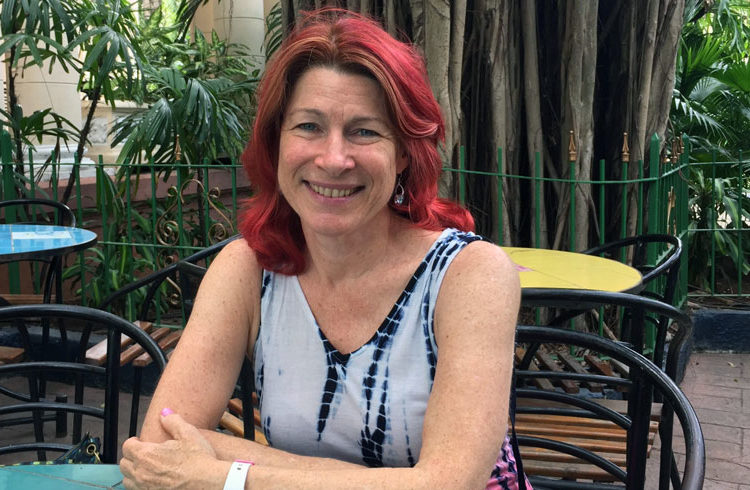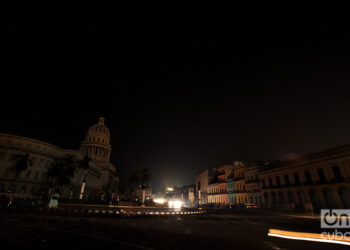Donna Marie Factor defines herself as an American who is very Cuban. A professor of Spanish in El Camino College, California, she feels joined to Cuba since two decades ago she discovered the virtues of the island’s music.
Ever since she was a child Donna fell in love with the flute and the guitar, but she understood that living off of music in the United States could be difficult. That’s why she decided to devote herself professionally to teaching Spanish in her country’s university institutions.
That’s how she found the road that brought her to Cuba.
“On one occasion one of my students from the California State University invited me to a nightclub in Los Angeles called El Floridita, and there I saw a band playing Cuban music,” she tells OnCuba.
Until then my knowledge of Cuban art was very limited, but when I heard that I was completely fascinated,” she confesses.
“There was a detail that greatly caught my attention: the band’s director was not Cuban but rather an American. I realized then that I didn’t have to be Cuban to play that music, which seemed very good to me. I approached her and was her student for several years. The classical music passed on to second place for me.”
“I know that the road I have taken is challenging, because Cuban music has something that makes it different from the others and makes it fascinating,” she affirms.
In the late 1990s, Donna organized a trip to the island to meet Richard Egües, one of the most complete Cuban flutists of all times. Starting then the musician of the popular Orquesta Aragón became her mentor.
“I started visiting Cuba twice a year, and on each trip I spent two weeks here. Richard became like a second father to me because I had a very close relationship with him until he passed away,” says Donna.
“I believe he was a great musician: the things he could do were incredible and his improvisation was impressive. I had never heard anyone like him,” she says about her teacher.
Teaching Spanish with Cuban music
Approaching Cuban music and culture has given Donna the possibility of using her knowledge to teach Spanish. The musician/professor has created didactic strategies to promote the language of Cervantes in U.S. classrooms.
“I began an interesting project that favors the learning of Spanish through Cuban and Latin American music,” she explains. “I have a repertoire of songs I use so that the students can have fun and correctly use the grammar.”
“I use the songs to teach vocabulary and also the verb tenses, and the past and present tenses…. I have several techniques for that: at times the students have to listen to a song and fill in the blank spaces or find examples for the use of the subjunctive,” says Donna, who in addition has written biographical reviews of the best-known idols of Cuban and Latin American music.
At present the university professor continues learning in depth about Cuban music with Joaquín Oliveros, who was the flutist in the Enrique Jorrín band.
“I’ve been lucky in Cuba. Here many doors have been opened for me. It’s incredible! Perhaps it’s a spiritual path which life has chosen for me,” she comments to OnCuba.
To mutually know each other
Donna doesn’t hide her enthusiasm about Cuba. Based on her experience, those born on this island are very intelligent and creative, and they possess a great personal strength to face life.
“I like this country a great deal: its people, its culture, its music. Here there is a great wealth that many don’t know about in the United States,” she affirms.
In her opinion, looking for meeting points between Cuba and the United States is indispensable to advance in the normalization of bilateral relations.
“I understand that relations have been very difficult for many years, but that can start changing. And the cultural exchanges must continue and not be limited by political questions,” she opines.
Certain of this, in October 2017 Donna organized a symposium in her university “to build a cultural bridge, something that politics doesn’t do.”
“We had money and motivation to do it. Therefore I took on the initiative,” she proudly says.
Although she wasn’t able to take poet and ethnologist Miguel Barnet, as she wished, the symposium had different papers about Cuba: about music, health, sports. Now she is set on organizing another event, but on the island and she already started working to make it a reality.
Donna regrets that Americans, especially the younger ones, don’t know much about Cuba and that they neither have a clear idea about the historic links between both countries.
“That’s why it is necessary to continue bringing our cultures and our peoples together. To have good relations we have to mutually know each other,” she affirms convinced.










